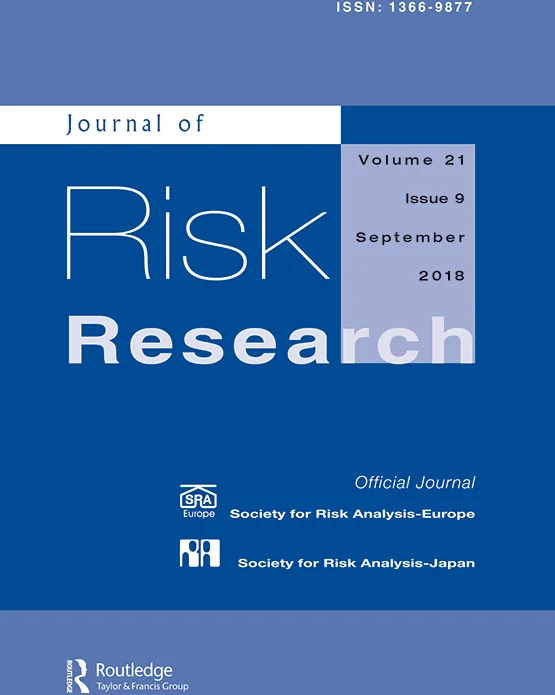新冠肺炎大流行中机构信任对风险感知和风险管理的矛盾影响:来自三个社会的证据
IF 1.7
4区 管理学
Q1 SOCIAL SCIENCES, INTERDISCIPLINARY
引用次数: 4
摘要
摘要采用社会放大风险框架和信任悖论的理论视角,研究了在新冠肺炎大流行的背景下,香港、台湾和中国大陆三个社会中,人们对媒体信息的关注如何影响他们的风险感知和风险管理行为(即疫苗接种意愿)。通过在线调查小组共获得9575份有效样本。结果显示,媒体的关注显著影响了三个社会的风险感知和风险管理。然而,机构信任可以放大或减弱不同社会的风险感知和风险管理:虽然台湾和中国大陆发现机构信任对人们的风险感知有积极影响,但香港发现了负面影响。此外,机构信任的不同维度(我们称之为基于能力的信任和基于善意的信任)被发现在不同社会中介媒体关注对风险感知和风险管理的影响:虽然这两个维度对台湾都是重要的中介,但基于善意的信托和基于能力的信托是中国大陆和香港唯一的中介,分别地制度信任对风险感知和风险管理的矛盾影响通过三个社会中每一个社会特有的背景因素进行了解释,并补充了对公众如何将风险管理责任分配给不同社会的风险管理机构的事后分析。总体而言,研究结果通过强调媒体和机构作为塑造风险感知的社会站的作用,为社会放大风险框架(SARF)提供了实证支持。本文章由计算机程序翻译,如有差异,请以英文原文为准。
The paradoxical effects of institutional trust on risk perception and risk management in the Covid-19 pandemic: evidence from three societies
Abstract Adopting the theoretical lenses of social amplification of risk framework and trust paradox, this study examines how people’s attention to media information influences their risk perception and risk management behaviors (i.e. vaccination intention) in the context of the Covid-19 pandemic in three Chinese societies (i.e. Hong Kong, Taiwan, and Mainland China). A total of 9,575 valid samples were obtained via online survey panels. The results revealed that media attention significantly influenced risk perception and risk management across the three societies. Institutional trust, however, could amplify or attenuate risk perception and risk management in different societies: While institutional trust was found to have a positive impact on people’s risk perception in Taiwan and Mainland China, a negative impact was discovered in Hong Kong. Moreover, different dimensions of institutional trust, which we term ability-based trust and benevolence-based trust, were found to mediate the effect of media attention on risk perception and risk management in different societies: While both dimensions were significant mediators for Taiwan, benevolence-based trust and ability-based trust was the only mediator for Mainland China and Hong Kong, respectively. The paradoxical impact of institutional trust on risk perception and risk management is explained with contextual factors specific to each of the three societies, supplemented with post-hoc analysis on how publics assign risk management responsibility to risk management institutions in different societies. Overall, the results provide empirical support to the social amplification of risk framework (SARF) by highlighting the roles of media and institutions as social stations that shape risk perception.
求助全文
通过发布文献求助,成功后即可免费获取论文全文。
去求助
来源期刊

Journal of Risk Research
SOCIAL SCIENCES, INTERDISCIPLINARY-
CiteScore
12.20
自引率
5.90%
发文量
44
期刊介绍:
The Journal of Risk Research is an international journal that publishes peer-reviewed theoretical and empirical research articles within the risk field from the areas of social, physical and health sciences and engineering, as well as articles related to decision making, regulation and policy issues in all disciplines. Articles will be published in English. The main aims of the Journal of Risk Research are to stimulate intellectual debate, to promote better risk management practices and to contribute to the development of risk management methodologies. Journal of Risk Research is the official journal of the Society for Risk Analysis Europe and the Society for Risk Analysis Japan.
 求助内容:
求助内容: 应助结果提醒方式:
应助结果提醒方式:


